|
In the workplace, one of your colleagues behaves with you as a close friend, a well-wisher, and gives you a lot of praise. However, at the same time, he talks ill about you with other colleagues and seizes every opportunity to damage your reputation without your knowledge. More importantly, he twists your communications with others negatively and spreads negativity about you among others. In such a scenario, how do you deal with this colleague?
---- Dealing with a manipulative and toxic colleague can be challenging, but it's essential to address the situation professionally and assertively. Here's a step-by-step guide on how to handle this situation: 1. Stay Calm and Objective: Remain composed and avoid reacting emotionally to the situation. Emotions can cloud judgment. Try to view the situation objectively.
0 Comments
(p) “settlement" means a settlement arrived at in the course of conciliation proceeding and includes a written agreement between the employer and workmen arrived at otherwise than in the course of conciliation proceeding where such agreement has been signed by the parties thereto in such manner as may be prescribed and a copy thereof has been sent to an officer authorised in this behalf by] the appropriate Government and the conciliation officer.
--- Section 2(p) of The Industrial Disputes Act, 1947, defines the term "settlement." The interpretation of this section in detail is as below: 1. Settlement in Conciliation Proceedings:
An organization must guarantee that the HR Department delivers a written or verbal response to all candidates who were not selected after attending an interview. Remember, today's unsuccessful candidate could be tomorrow's perfect fit. Providing a positive experience for candidates will keep them motivated to pursue positions within your company. This approach not only enhances the company's branding but also strengthens the HR department's reputation. Here is a sample e-mail to be sent to the not selected candidates. For example, the position is Manager - Business Development.
Fostering a psychologically safe workplace is the foundation that enables a great attitude to flourish. From this attitude, great behaviors emerge, paving the path for remarkable actions and ultimately, transformative results.
In the fast-paced and competitive world of business, organizations often prioritize performance metrics, profit margins, and market share. While these are undoubtedly essential aspects of success, there's another, often overlooked, factor that can significantly impact an organization's long-term health: Psychological Safety. This article delves into the concept of psychological safety, its profound implications, and how it played a pivotal role in the case of Ms. Rishika, a Sales Manager whose career took an unexpected turn due to the absence of psychological safety in her workplace. Mr. Krish, a technically qualified graduate engineer, has held the position of production manager at a company for a decade. He has displayed commendable proficiency in product management, process optimization, and effective team leadership. However, his approach lacks assertiveness and creativity and often appears lethargic. Notably, Krish seems content with his current role and shows no inclination towards pursuing higher career growth, despite multiple attempts by his superiors to address these concerns. Consequently, he has been assigned you as a mentor. As his mentor, how do you deal with this?
--- Mentoring Mr. Krish, who appears to be technically proficient but lacks assertiveness and creativity, can be a challenging but rewarding task. 1. What is the purpose of Karnataka Act No. 33 of 2023?
The purpose of Karnataka Act No. 33 of 2023, titled "The Factories (Karnataka Amendment) Act, 2023," is to make further amendments to the Factories Act, 1948, specifically in its application to the state of Karnataka. 2. When was Karnataka Act No. 33 of 2023 first published? Karnataka Act No. 33 of 2023 was first published in the Karnataka Gazette Extra-ordinary on the 7th day of August, 2023 3. When did Karnataka Act No. 33 of 2023 receive the assent of the President? Karnataka Act No. 33 of 2023 received the assent of the President on the 10th day of July, 2023. “One of your key employees had submitted his resignation, and despite your efforts to retain him through a counteroffer, he remained firm in his decision to leave the company. Initially, you felt disappointed by his choice and, admittedly, frustrated with his approach.
Approaching the end of the notice period, the employee approached you expressing a desire to withdraw his resignation by accepting the counteroffer provided earlier. How would you make a decision in such a situation?” Considering the situation, there are several positives and negatives to weigh when deciding whether to accept the employee's request to reconsider his decision to leave the company. Managers play a crucial role in developing average performers. While their performance might be average due to various factors, managers are also accountable to some extent. It's essential for managers to motivate these employees, helping them accept their current situation and inspiring them to overcome their weaknesses. When submitting performance reports, it's vital to communicate this message effectively.
Section 18 of the Sexual Harassment of Women at Workplace (Prevention, Prohibition, and Redressal) Act, 2013 deals with the right of an aggrieved person to file an appeal in case they are dissatisfied with the recommendations made in their case or if the recommendations have not been implemented.
A detailed understanding is as below: Sub-section 1:Any person aggrieved from the recommendations made under sub-section (2) of section 13 or under clause (i) or clause (ii) of sub-section (3) of section 13 or sub-section (1) or subsection (2) of section 14 or section 17 or non-implementation of such recommendations may prefer an appeal to the court or tribunal in accordance with the provisions of the service rules applicable to the said person or where no such service rules exist then, without prejudice to provisions contained in any other law for the time being in force, the person aggrieved may prefer an appeal in such manner as may be prescribed.
Drafting a chargesheet is a critical process that requires careful attention to detail and clarity. Here are some essential points to remember while drafting a chargesheet:
1. Be Specific and Clear:
2. Avoid Vagueness:
3. Include Relevant Details:
Empathetic & Situational Leadership: Addressing Employee Grievances Regarding Salary Increments12/24/2023 After distributing the salary increment letters to the team, one of the team members came to you and expressed his dissatisfaction about his increment, as he received 0.5% less than another employee. As a leader, how do you deal with this?
Addressing individual concerns fairly and transparently is vital for fostering a positive work environment. When confronted with comparison-based grievances, it's essential to handle the situation professionally and empathetically. Here's how you can effectively address the team member's dissatisfaction:
Bhima Rao HR Adviser & Trainer Impact of Liberalization and Globalization on Human Resource function is huge and transformation has happened quickly in our country. HR domain is growing in-depth as well in length & breadth. Thus new experiments are taking place in progressive organizations which has given rise for ample opportunity to broaden the HR domain. We are seeing the most dynamic, tough & critical situations all over the world and thus HR has occupied pivotal role in all types of organizations whether it is in Manufacturing, Engineering, Mining, Automobile, Education, Retail, Banking and Financial services, IT, ITES, Bio Technology, Service Industry like Health, Transport and Tourism and even in NGOs. Today’s HR function is totally aligned to achieve organizational goals. In this journey, the HR function has faced several tough challenges which are resulting to offer quick and efficient HR services to employees; work with Business Leaders to achieve organizational goals and so on so forth.
He and she attended a company-nominated training program outside the company premises. After the training program, she complained to the ICC that he sexually harassed her during the training program. Is this complaint valid under the Sexual Harassment of Women at Workplace (Prevention, Prohibition, and Redressal) Act, 2013?
YES. The incident took place during a training program, and according to the Act, the venue of the training program is the workplace. The Prevention, Prohibition, and Redressal (PPR) approach is a key feature of the POSH Act, 2013. This approach aims to create safe and harassment-free workplaces for women.
Prevention: It refers to the steps taken by the employer to prevent sexual harassment in the workplace. Employers must take measures such as establishing internal committees, conducting awareness and sensitization programs and implementing policies and guidelines to prevent sexual harassment in the workplace. Prohibition: This refers to the prohibition of sexual harassment in the workplace. Here, prohibition is strictly related to restricting unwelcoming acts/behaviors in the workplace related to sexual harassment. Employers must communicate such restrictions through policy, process, and awareness programs. They must ensure that their employees, including visitors, are aware of such prohibitions. Redressal: This refers to the mechanisms put in place to address and redress complaints of sexual harassment in the workplace. Employers are required to establish internal committees to address sexual harassment complaints, and employees have the right to file complaints with the committee if they experience any form of sexual harassment. What kinds of harassment are illegal as per POSH Act, 2013?
The Prevention of Sexual Harassment at Workplace Act, 2013 (POSH Act) defines Sexual Harassment as any unwelcome acts or behavior, whether directly or by implication. In line with this, the following acts are considered illegal:
A male worker kept a romantic song as his phone ringtone. Hearing this, a female colleague filed a sexual harassment complaint against the male worker with the ICC. Is it valid?
→Whether this complaint is valid or not depends on the particular circumstances of the case and the provisions of the POSH Act, 2013. In this context, it may be difficult to determine whether a male worker's choice of ringtone is sufficient to constitute sexual harassment. →As per POSH Act, sexual harassment is unwelcome sexual conduct, whether verbal, non-verbal, or physical. If the male worker's choice of ringtone is based on sexual content or innuendo, or if it creates a hostile work environment for the female colleague, it may be considered sexual harassment. →However, if the ringtone is simply a romantic song with no sexually explicit content, it may not be considered sexual harassment under the law. It is essential to consider the context in which the ringtone is played, the impact it has on the female colleague, and whether it interferes with her ability to work in a comfortable and safe environment. →The ICC must thoroughly investigate the matter, gather evidence and determine whether the male worker's conduct meets the definition of sexual harassment of the act before proceeding. The wife & husband work in the same company and are allowed to work from home from 8:00 am to 5:00 pm. They took financial benefit from the company to buy the required furniture to work from home. After a few days, the wife complained to ICC that her husband had sexually harassed her during working hours. Is this complaint valid under the Sexual Harassment of Women at Workplace (Prevention, Prohibition, and Redressal) Act, 2013?
YES As per POSH Act 2013, we have an excellent POSH policy and constituted an IC Committee. As we meet these requirements, we do not have time to provide POSH training to employees due to production pressure. Is this okay?
No, it is not okay. As per the POSH Act 2013, every employer must provide awareness through training programs at regular intervals for all employees (including contract labour & trainees) on the prevention of sexual harassment. Such programs must sensitize the employees to the provisions of the Act. The POSH awareness sessions must cover the following:
Can inappropriate behavior occurring outside of the factory premises still be considered a violation of the POSH Act?
Yes. The inappropriate behavior that occurs outside the workplace but has a nexus to the workplace can still be considered a violation of the POSH Act. As per section 2 (o) (v) of the Act, the workplace includes: any place visited by the employee arising out of or during the course of employment including transportation by the employer for undertaking such journey. In line with this, if a woman employee is subjected to inappropriate behavior by a co-worker, supervisor, or customer during a work-related event or on work-related travel, it will be considered a violation of the POSH Act. Can a person file a complaint of sexual harassment anonymously under POSH?
Yes. The POSH Act allows a person to file a complaint of sexual harassment anonymously. The act allows this to protect the identity of the person making the complaint. This can help the complainant to feel more secure in making the complaint, especially in cases where the complainant may be concerned about victimization. Anonymity can also encourage more people to come forward and report incidents of sexual harassment, which can help to create a safer and more respectful workplace for everyone. The POSH Act recognizes the need for confidentiality in such cases, and complainants have the option to request the ICC not to reveal their identity during the inquiry. However, it is essential to note that submitting an anonymous complaint may affect the credibility of the complaint and investigation. This may limit the ICC's ability to gather evidence and conduct a thorough investigation. In our company, we have ten male employees and no female employees. Is it necessary to constitute an Internal Committee under the POSH Act, 2013?
→Yes. →If a workplace does not have any female employees, it is still necessary to constitute an Internal Committee (IC) under the Prevention of Sexual Harassment (POSH) Act, 2013. →The POSH Act mandates that every workplace with ten or more employees, regardless of gender composition, must establish an IC to address and prevent sexual harassment in the workplace. The aggrieved woman requested the Internal Committee (IC) of POSH to allow Advocate to represent in the inquiry process. Is this valid?
→NO. →As per the POSH Act, 2013, both the parties to the complaint are not permitted to bring their Advocates/Legal Practitioners to participate in the IC Inquiry Process. The Company formed the Internal Complaints Committee (ICC) to meet the requirements of the POSH Act - 2013, but it did not include an external member. In this situation, is the committee valid?
NO. As per the POSH Act of 2013, every ICC must include at least one external member who is not associated with the organization or does not work in the same industry. A supervisor complains to HR that one of the female team members is often idle in her workstation without performing the assigned tasks. HR asked him to provide proof for the same. To provide evidence, the supervisor took a photo of the female team member while she was not working at her workstation. The female team member objected to the supervisor's act and reported as sexual harassment to the IC. Is it valid?
→The complaint is not valid as the POSH Act, 2013 defines sexual harassment as any unwelcome physical, verbal, or non-verbal conduct of a sexual nature that could create an intimidating, hostile, or offensive work environment. →The points because the complaint is not valid are:
Can ICC forward sexual harassment complaint to the police without the consent of the aggrieved woman?
→No. →Under the POSH Act, 2013, the Internal Complaints Committee (ICC) cannot forward a complaint of sexual harassment to the police without the consent of the aggrieved woman. →The ICC is responsible for investigating complaints of sexual harassment and making recommendations for appropriate action within the organization. →The ICC may refer a complaint to the police when a settlement has been agreed upon between the parties, but the respondent has failed to comply with the settlement terms. →It is important to respect the confidentiality and privacy of the aggrieved woman during the ICC's proceedings and to ensure that her consent is obtained before taking any further action. |
Categories
All
HR Learning and Skill Building AcademyMHR LEARNING ACADEMYGet it on Google Play store
|
SITE MAP
SiteTRAININGJOB |
HR SERVICESOTHER SERVICESnIRATHANKA CITIZENS CONNECT |
NIRATHANKAPOSHOUR OTHER WEBSITESSubscribe |
MHR LEARNING ACADEMY
50,000 HR AND SOCIAL WORK PROFESSIONALS ARE CONNECTED THROUGH OUR NIRATHANKA HR GROUPS.
YOU CAN ALSO JOIN AND PARTICIPATE IN OUR GROUP DISCUSSIONS.
YOU CAN ALSO JOIN AND PARTICIPATE IN OUR GROUP DISCUSSIONS.
|
|


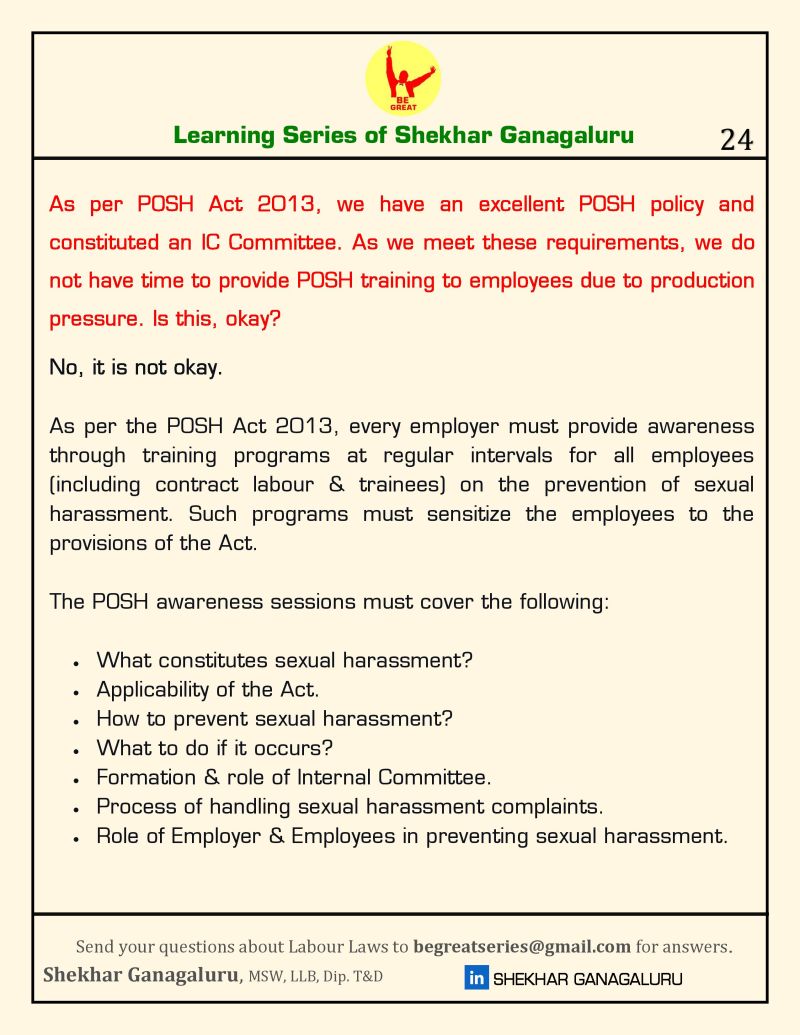
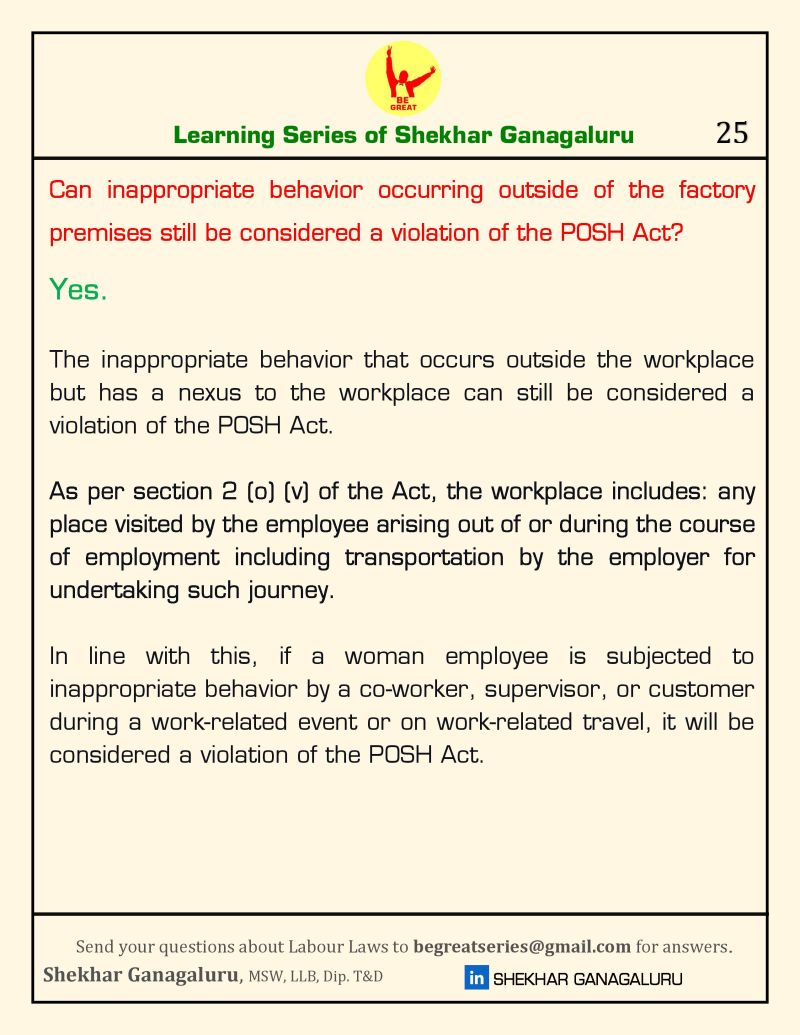
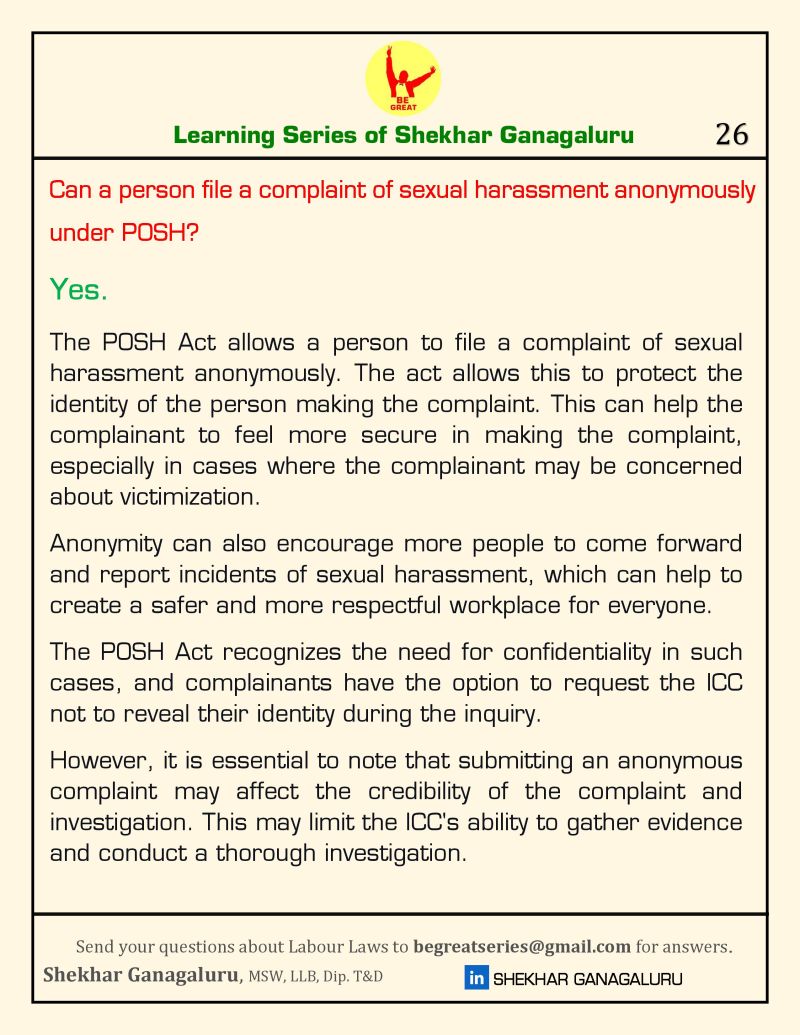
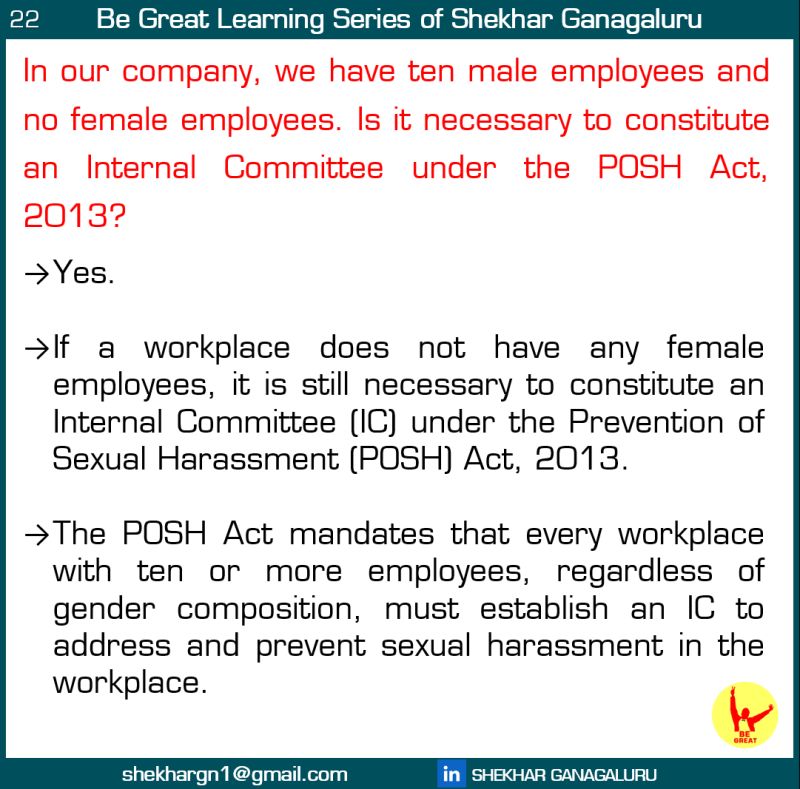
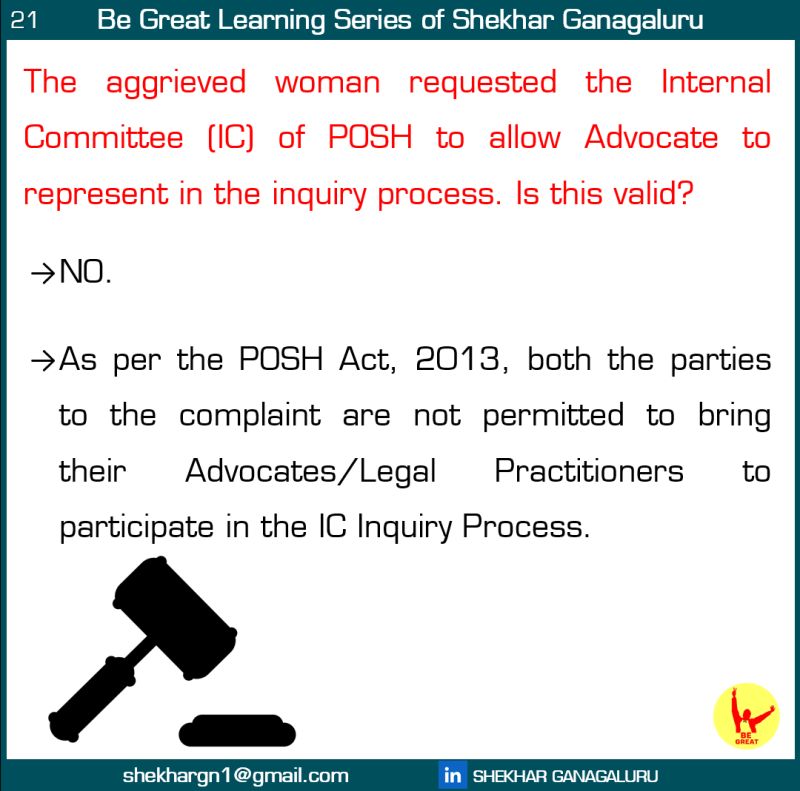
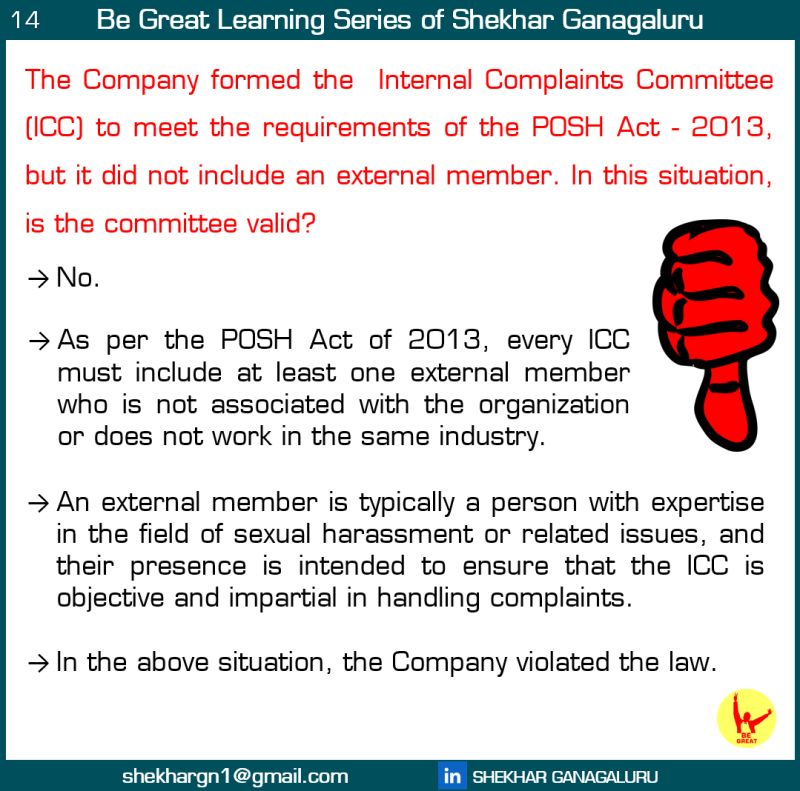

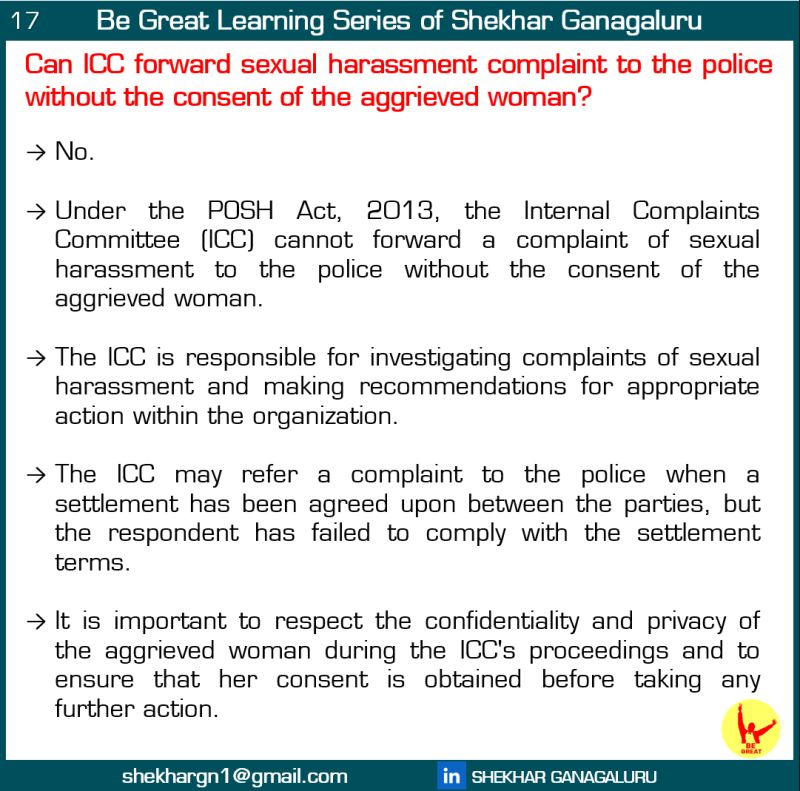




 RSS Feed
RSS Feed





